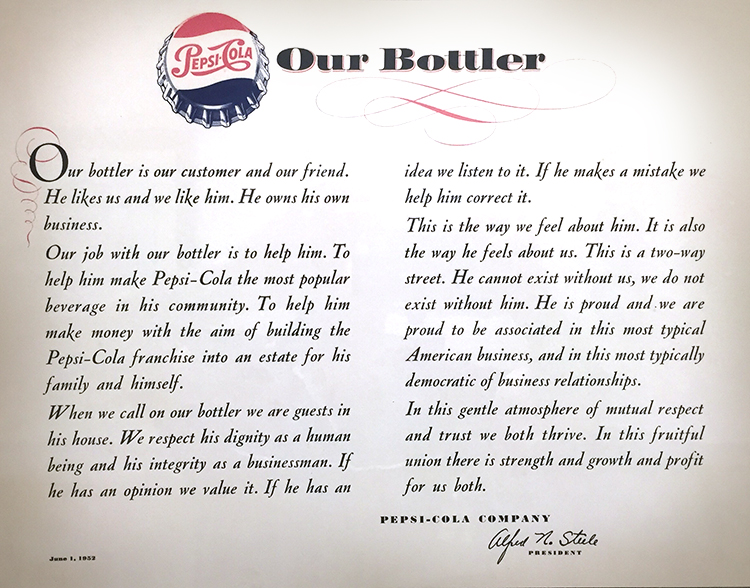
History of the Family Bottler
- Pepsi-Cola like most other soft drink companies started as a fountain drink. Advances in bottling techniques and equipment at the beginning of the 1900s made bottling soft drinks easier and more reliable. In 1905, the Pepsi-Cola Company began to offer the rights to bottle Pepsi-Cola. Among the earliest Pepsi-Cola bottlers were Charlotte, North Carolina, Durham, North Carolina and Charlottesville, Virginia. In 1910, the first Pepsi-Cola Bottlers national meeting was held and during that meeting Pepsi-Cola bottlers organized an Association. The Association helped bottlers improve their bottling techniques and was a forum for exchanging ideas and finding solutions to problems. They helped institute deposits on bottles and worked on ways to improve the image of bottling plants.
- The World War II rationing laws were very detrimental to the Pepsi-Cola Company obtaining sugar to produce Pepsi-Cola, and the sugar rationing rules and regulations were written to favor the Coca-Cola Company. Many of the bottlers, unwilling to let the sugar situation be the demise of the Pepsi-Cola Company, figured out all kinds of ways to procure sugar. Many of them stopped bottling their flavor drinks and used all their sugar for Pepsi-Cola. These efforts helped to keep Pepsi-Cola operating during World War II.
- When the Pepsi-Cola bottling plant in Sedalia, Missouri burned down it was all the other Pepsi-Cola bottlers that came to the aid of bottler, Julian Bagby. They produced Pepsi-Cola for him, loaned him trucks, and helped keep him in business until he could rebuild. The independent bottlers are often referred to as family-owned bottling operations. The word “family” for bottlers is more than just people they are related to, it’s also the other Pepsi-Cola bottlers they’ve stood shoulder to shoulder with as they fought the cola wars together.
- In the 1930s when Pepsi-Cola began to re-franchise, some qualified bottlers could not afford the $315 to buy the concentrate. Very often other Pepsi-Cola bottlers would offer to split a unit of concentrate to help the new bottler get started.
- The Pepsi-Cola Company experimented with cans in the late 1940s and the early 1950s. Improvements in the liner made cans more acceptable to consumers in the 1960s. Pepsi-Cola in cans could not be produced on the same lines that produced bottle Pepsi-Cola, and can sales were not large enough to justify bottlers adding a can line to their operations. To solve this problem, bottlers formed cooperatives where they could pool their money to build a plant solely for producing Pepsi-Cola in cans. Over time these cooperatives evolved into central production facilities that have become a great benefit to the Pepsi-Cola system.
- The Federal Trade Commission began an investigation in 1969 as to whether or not the soft drink franchise system was anti-competitive, and they eventually ruled that it was. The Pepsi-Cola bottlers, working through the Pepsi-Cola Bottlers Association, fought the FTC for almost 11 years. They eventually lobbied Congress to pass a bill that would protect the franchises system, and on July 10, 1980 President Jimmy Carter signed the Soft Drink Interbrand Competition Act into law. The purpose of the legislation was to “clarify the circumstances under which territorial provisions in licenses to manufacture, distribute, and sell trademarked soft drink products are lawful under the antitrust laws.”
- Post-World War II inflation made it impossible for the Pepsi-Cola Company to continue selling the 12 ounce bottle of Pepsi-Cola for five cents. Pepsi-Cola’s reputation was built on the big 12 ounce bottle for a nickel, and many believed that if the price was changed Pepsi-Cola would lose their customers. At that time, the public believed that the soft drink should only sell for five cents regardless of the size. Toward the end of the 1940s, the situation became critical for the Pepsi-Cola Company and Pepsi-Cola bottlers along with a group of bottlers in the Midwest came up with the idea of creating a 10 ounce bottle and selling it for five cents. The 10 ounce bottle was just as tall as a 12 ounce bottle but was a little narrower, and this bottle helped save Pepsi-Cola and many bottlers.
Bob Stoddard
 Bob Stoddard is recognized as the leading authority on Pepsi-Cola history and memorabilia. His interest in collecting first began in 1977, with the purchase of a vintage Pepsi cooler to house an ample supply of Pepsi-Cola. Stoddard was featured as a leading expert on Pepsi-Cola history in The Cola Wars, a historical documentary on the History Channel. He has also served as historical consultant for movies such as Oliver Stone’s Nixon, and has appeared on numerous television and radio shows such as History Channel, Fox FX, The Discovery Channel, and numerous television and radio shows to recount the history of the Pepsi-Cola Company. Signs and bottles from his collection have been featured in television shows and commercials including the Britney Spears Pepsi and Pepsi Pass commercials. His collection has been featured in many newspaper and magazine articles worldwide. Stoddard continues to research the history of Pepsi-Cola and Pepsi Family Bottlers. His reputation for thorough research, and keen knowledge of antique advertising memorabilia soon led to a consulting agreement with the Pepsi-Cola Company. He has traveled throughout the country displaying his collection at Pepsi-Cola sponsored functions. He has written 14 books on Pepsi memorabilia and history. Stoddard has been the historian for the Pepsi-Cola Company since 2012.
Bob Stoddard is recognized as the leading authority on Pepsi-Cola history and memorabilia. His interest in collecting first began in 1977, with the purchase of a vintage Pepsi cooler to house an ample supply of Pepsi-Cola. Stoddard was featured as a leading expert on Pepsi-Cola history in The Cola Wars, a historical documentary on the History Channel. He has also served as historical consultant for movies such as Oliver Stone’s Nixon, and has appeared on numerous television and radio shows such as History Channel, Fox FX, The Discovery Channel, and numerous television and radio shows to recount the history of the Pepsi-Cola Company. Signs and bottles from his collection have been featured in television shows and commercials including the Britney Spears Pepsi and Pepsi Pass commercials. His collection has been featured in many newspaper and magazine articles worldwide. Stoddard continues to research the history of Pepsi-Cola and Pepsi Family Bottlers. His reputation for thorough research, and keen knowledge of antique advertising memorabilia soon led to a consulting agreement with the Pepsi-Cola Company. He has traveled throughout the country displaying his collection at Pepsi-Cola sponsored functions. He has written 14 books on Pepsi memorabilia and history. Stoddard has been the historian for the Pepsi-Cola Company since 2012.
Historical Timeline
Formation of the PCBA
Incorporation of PCBA as a non-profit
Carolina Canners, Inc. was born and built under the leadership of Bobby Avent of Pepsi-Cola Bottling Company of Bennettsville, SC and Brantley Burnett of Roxboro
Twelve independent Pepsi bottlers, primarily in New England, formed EPIC Enterprises, Inc. the Ayer, Massachusetts-based canning co-op. EPIC (Enjoy Pepsi in Cans) was a unique operation designed to meet New England’s need for cans
Wis-Pak, Inc. founded and based in Watertown, Wisconsin
Soft Drink Interbrand Competition Act signed into law by President Jimmy Carter (Pepsi-Cola bottlers, working through the PCBA, fought the FTC for almost 11 years, eventually lobbying Congress to pass a bill that would protect the franchises system)
CPF Co-Op, Inc. was founded, with operations commencing in 1983. Made up of Pepsi bottling members serving most of New England, CPF bottles Pepsi products and NEHF (New England Hot Fill) bottles Pure Leaf Iced Tea and Aquafina water
PCBA publishes Antitrust Guidelines
Northeast Hot Fill (NEHF) founded to meet demands for the new Lipton Original Tea product. Incorporated in 1993, production began in 1994
Bottler agreement of National CDA cost sharing, the “Rule of 1994”, signed
Global Procurement Agreement signed
Seventeen Pepsi bottlers, including anchor bottler Pepsi Bottling Group, Inc. form a regional manufacturing joint venture called Pepsi Northwest Beverages LLC (PNB). Operating in the Pacific Northwest region of the country, the new entity includes PBG’s manufacturing plants in Seattle and Portland, Oregon, and three bottler-owned co-ops
Commissary Agreement signed (1997 and 2004 as well)
10-year Fountain Syrup Commissary Agreement Signed
10-year Gatorade Small Format Distribution Agreement Signed
PCBA creates a For-Profit wholly owned subsidiary PCBA Vault, Inc.
PCBA introduces Programs designed to reduce Bottlers’ risk and leverage Bottlers’ buying power.
PCBA begins to work on a Test & Learn eCommerce Agreement ~ 8 Bottlers agree to participate
PCBA Multiple Employer Program 401(k) service designed to leverage $1Bn in 401(k) assets to reduce fees offer employees better services.
Columbus Captive to address General Liability, Workman’s Compensation and Vehicle Liability
Cyber Security services
Formation of the Blue System Council
PCBA forms PCBA Advisory Council to work with PepsiCo
Advisory Council organized 10 Committees with a PCBA Board Member as Chair
PCBA aligns and signs a ground breaking eCommerce Agreement with PepsiCo
2020 PCBA works with PepsiCo to reimagine and reset the Franchise relationship
PCBA negotiates and signs a Fountain Syrup Commissary Agreement with PepsiCo
PCBA works with PepsiCo on an Omnibus Amendment to reaffirm Bottlers’ EBA are perpetual, continuous agreements
PCBA works with PepsiCo on a Gatorade Large Format Agreement PCBA works with PepsiCo on SodaStream test and learn Agreement
PCBA works with PepsiCo on a Bottle & Can Commissary Agreement | PepsiCo agrees to a unique closure